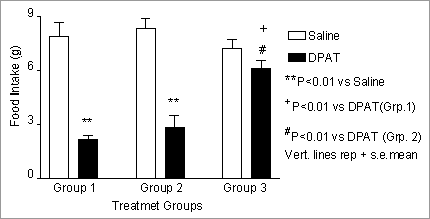The effects of chronic administration of phenelzine and caffeine on 8-OH-DPAT-induced hypophagia in rats
We have previously reported that the suppressant effect of the 5-HT1A receptor agonist 8-OH-DPAT on feeding in food-deprived rats (Ebenezer, 1992) is abolished following chronic treatment with the antidepressant drug fluoxetine, a selective serotonin reuptake inhibitor (SSRI; Tite et al., 2003). We suggested that chronic administration with fluoxetine desensitises central 5-HT1A receptors that leads to the loss of effect of 8-OH-DPAT on food intake (Tite et al., 2003). The present study was undertaken to investigate whether chronic administration of (a) phenelzine, an antidepressant drug that is a monoamine oxidase inhibitor (MAOI), and (b) caffeine, a psychomotor stimulant drug, would affect the hypophagic effects of 8-OH-DPAT. Male Wistar rats (b.wt. 250 – 300 g; n=24) were randomly divided into 3 equal groups and maintained on a restricted diet (i.e. they were allowed free access to food during the light cycle between 13.00 – 15.00 h) during week days. The rats were injected i.p. once daily for 28 days with either physiological saline solution (Group 1), caffeine (10 mg kg-1; Group 2) or phenelzine (10 mg kg-1; Group 3). On treatment day 27, the animals in all groups were injected s.c. with saline at the start of their feeding period to establish a control feeding baseline. The animals were placed singly in experimental cages and food intake was measured for 30 min, as described previously (Ebenezer, 1992). A similar protocol was followed on day 28 except that the rats were injected with 8-OH-DPAT (100 µg kg-1). The results obtained are shown in Fig.1. ANOVA and Newman Keul post-hoc tests revealed that (i) there were no significant differences amongst the 3 groups in their baseline food intake measured on treatment day 27 following saline injection [F(2,21) = 0.9261, ns], (ii) the inhibition of food intake by 8-OH-DPAT observed for Group 1 was significantly attenuated after chronic treatment with phenelzine (Group 3) but not caffeine (Group 2) [F(2,21) = 19.81, P<0.0], and (iii)) there was a significant interaction between Group 1 and Group 3 and their responses to saline and 8-OH-DPAT [F(1,14) = 24.7976, P<0.01], indicating that chronic treatment with phenelzine reverses the hypophagic effect of 8-OH-DPAT. It is noteworthy that the gain in body weight of the rats treated with phenelzine over the 28 day treatment period was approximately 17% less that of the control animals. Interestingly, this did not significantly affect baseline food consumption in these rats. Fig.1. The effects of saline (baseline feeding) and 8-OH-DPAT (abbreviated DPAT) on food intake.
The results show that chronic administration with phenelzine, but not caffeine, attenuates the suppressant effects of 8-OH-DPAT on food intake in hungry rats. These findings provide behavioural support for the view that chronic exposure to MAOIs desensitise central 5-HT1A receptors (Shen et al., 2002). Ebenezer, I.S. (1992) NeuroReport 3, 1019 - 1022. |


